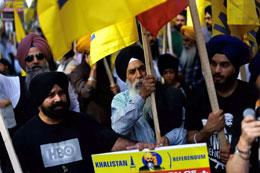Canada-India tensions deepen over killing

Canadian Sikhs staged protests outside India's diplomatic missions this week after Prime Minister Justin Trudeau said there may be a link between New Delhi and the murder of a SIkh leader in British Columbia
Canada's accusations have sparked tit-for-tat retaliation, with each nation expelling diplomats and New Delhi suspending visas for Canadians.
The diplomatic dispute escalated between Ottawa and New Delhi after Trudeau said his government was investigating “credible allegations of a potential link” between Indian government agents and the murder of Hardeep Singh Nijjar last June.
Nijjar, a prominent Sikh leader who had called for an independent Sikh state in India, was fatally shot outside a Sikh temple in Surrey, British Columbia.
The Indian government has denied Trudeau’s accusations as “absurd” and called on Canada to curb the activities of individuals it describes as “terrorists”, referring to Sikh separatists whom it views as a security threat.
“Peaceful protests are a key democratic right, however, we encourage Sikhs to remain vigilant and alert in the days ahead. We are concerned that attempts may be made during the protests to incite violence and vandalism in order to malign the Sikh community. This is a pattern we have seen from India in the past,” World Sikh Organisation president Tejinder Singh Sidhu said in a statement.
“At this time, the focus must remain on finding the killers of Hardeep Singh Nijjar and exposing the full extent of Indian interference in Canada. We believe that there will be ongoing attempts by India to shift this focus however we must do all in our power to ensure that these attempts are unsuccessful,” he said.
“If members of the community feel unsafe or see attempts to incite violence, we encourage them to immediately contact law enforcement.”
Muslim advocates in Canada have also expressed anger and concern at allegations that India may have been involved in the killing of a Canadian citizen.
“It was widely known that there are agents of the Indian government that were operating in Canada and targeting members of the diaspora community,” Stephen Brown, head of the National Council of Canadian Muslims (NCCM) advocacy group, told Al Jazeera.
“But going to the point where somebody would be assassinated right outside of a place of worship in broad daylight, the purpose of doing that is to send a message.”
Brown added that Canadian Muslims want the Trudeau government to “take action” to guarantee their safety. “I would say there’s outrage, but there’s also real concern that currently they’re not safe,” he said.
The Canadian government has not released evidence to back up its allegations against India, saying its investigation is ongoing.
The shocking accusation that India carried out an extrajudicial murder on Canadian soil – an allegation that has been denied by India – has prompted a re-examination of threats against Sikh separatists around the world, as well as Sikh activists’ claims of suspicious deaths in the UK and Pakistan in the weeks before the murder.
The FBI has warned at least three Americans active in the Sikh community that their lives were in danger in the immediate aftermath of the killing in British Columbia.
The Indian government has in recent months openly pursued and arrested Khalistani militants and sympathizers within its own borders, and Sikh groups have accused the government of taking its crackdown on dissent beyond the Indian territory, reported the Guardian.
The Khalistani movement gained traction in Punjab during the 1980s and 1990s and thousands of Punjabi Sikhs were killed in a crackdown on the separatist insurgency. Many thousands moved abroad, to places such as the UK and Canada, and the Khalistani ideology remained prevalent among the diaspora.
After Trudeau’s announcement on Sept. 18, Opposition leader Pierre Poilievre called on the government of India to act with the “utmost transparency” as Canadian authorities investigate Nijjar’ death.
Said NDP leader Jagmeet Singh said during members’ statements: “The practice of the Indian government has been one of division, violence, persecution and attacking those who are critical of [it].
“To hear the Prime Minister of Canada corroborate a potential link between a murder of a Canadian citizen on Canadian soil and a foreign government is something I could never have imagined.”
On Sept. 19, Canadian Foreign Affairs Minister Mélanie Joly confirmed that a senior Indian diplomat, Pavan Kumar Rai, had been removed from the Indian High Commission in Ottawa due to Canada’s most recent allegations.
India’s external affairs ministry denied Canada’s allegations of its interference and expelled an unnamed senior Canadian diplomat in response to the removal of Pavan Kumar Rai.
None of Canada’s most important allies – not the US, the United Kingdom, Australia or New Zealand, all knitted tightly together in the “Five Eyes” intelligence-sharing alliance – echoed Trudeau’s allegations.
They have declared their concern and urged full investigations. But none has stepped up to condemn India for its alleged involvement in the June slaying.
The Canadian government says it has amassed both human and signals intelligence in a months-long investigation into the Sikh separatist leader, CBC News reported last week, citing unidentified sources.
Canada is home to about 770,000 Sikhs, the highest population of Sikhs outside their home state of Punjab, and in recent years, many demonstrations there have irked India.
The allegations have put a spotlight on Canada’s Sikh community. Sikhs make up 2 percent of India’s 1.4 billion population, but they are a majority in Punjab, a state of 30 million people where their religion was born 500 years ago. – with agencies






